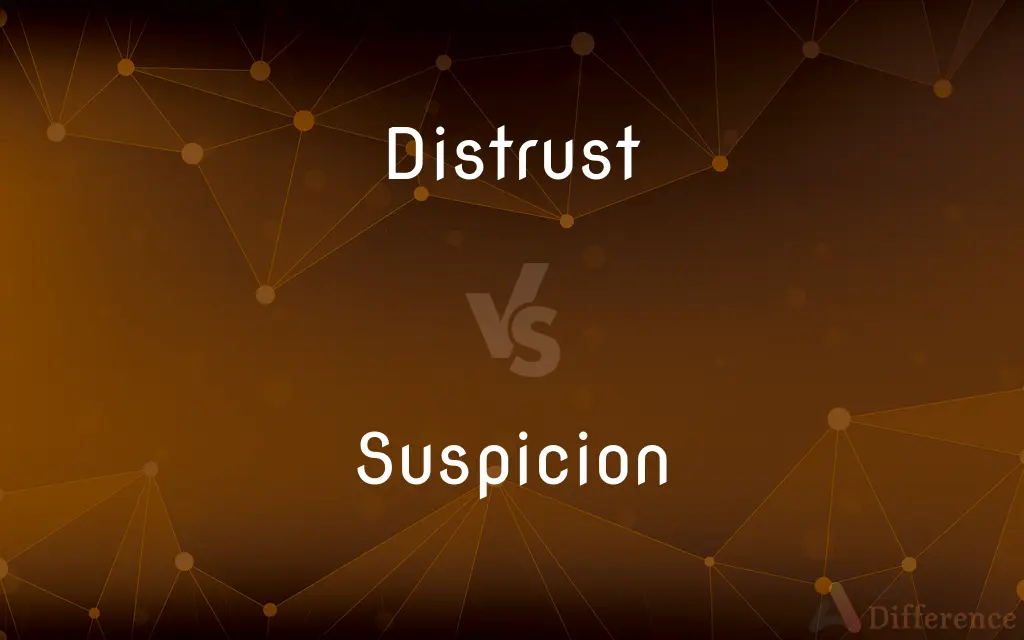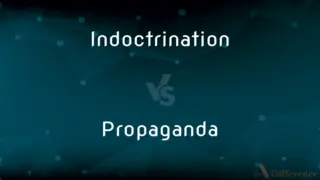Distrust vs. Suspicion — What's the Difference?
By Tayyaba Rehman — Updated on September 13, 2023
Distrust is a lack of confidence in someone, while suspicion is a feeling that someone might be guilty or deceptive without certain evidence.

Difference Between Distrust and Suspicion
Table of Contents
ADVERTISEMENT
Key Differences
Distrust is primarily centered around a lack of confidence or faith in someone or something. It often stems from prior experiences or a perceived lack of reliability. On the other hand, suspicion is less about past experiences and more about a gut feeling or intuition.
Distrust can be considered a more definitive stance, often based on knowledge or firsthand experience. Suspicion, however, is typically more speculative, existing without clear proof or definitive knowledge, making it more of a preliminary feeling.
When someone says they distrust a person, it implies they have reasons, potentially based on past interactions, to believe that the person is not trustworthy. Conversely, expressing suspicion about someone doesn't necessarily indicate any past negative interactions; it's more of an uncertainty about their intentions or actions.
While both distrust and suspicion involve a lack of trust, distrust is a conclusive lack of faith in someone, often demanding action or distance. Suspicion, being less conclusive, might prompt investigation or further scrutiny but isn't a final judgment in itself.
Comparison Chart
Nature
Definitive lack of confidence
Preliminary feeling or hunch
ADVERTISEMENT
Basis
Often based on experience
Typically without clear proof
Degree
Stronger, more resolute stance
More tentative or uncertain
Action Implication
Might demand action or distance
Might prompt investigation or scrutiny
Usage
Primarily a verb and noun
Mainly used as a noun
Compare with Definitions
Distrust
Lack of trust or confidence in someone or something.
I felt a deep distrust for the stranger.
Suspicion
A feeling of doubt without clear evidence.
She had a suspicion he wasn't telling the truth.
Distrust
A firm belief in someone's unreliability.
Her dishonesty bred distrust among her peers.
Suspicion
Uncertainty about someone's honesty or intentions.
His sneaky behavior raised suspicion.
Distrust
A defensive posture stemming from skepticism.
His story was so wild, it naturally evoked distrust.
Suspicion
A state of mind suggesting wariness.
Every misplaced item in the house was treated with suspicion.
Distrust
A hesitancy to accept or believe.
The news was met with distrust by the locals.
Suspicion
A hint or suggestion of something.
There's a suspicion of garlic in this sauce.
Distrust
A certainty of deceit or foul play.
Distrust clouded her judgment every time he spoke.
Suspicion
An inkling or intuition about something uncertain.
She had a strong suspicion that the secret was about her.
Distrust
Distrust is a formal way of not trusting any one party too much in a situation of grave risk or deep doubt. It is commonly expressed in civics as a division or balance of powers, or in politics as means of validating treaty terms.
Suspicion
A feeling or thought that something is possible, likely, or true
She had a sneaking suspicion that he was laughing at her
Distrust
The feeling that someone or something cannot be relied upon
The public's distrust of politicians
Suspicion
Cautious distrust
Her activities were regarded with suspicion by the headmistress
Distrust
Doubt the honesty or reliability of; regard with suspicion
Speculation remained that the Army distrusted the peace process
Suspicion
A very slight trace
A suspicion of a smile
Distrust
Lack of trust or confidence
Listened to the sales pitch with distrust.
Suspicion
The act or an instance of suspecting something on little or no evidence
His evasiveness aroused my suspicions.
Distrust
To have no confidence in; doubt or suspect
I distrust his claims to expertise.
Suspicion
The condition of being suspected, especially of wrongdoing
Held under suspicion of murder.
Distrust
Lack of trust or confidence.
Suspicion
The state or feeling of having no confidence or certainty about something; distrust
Looked with suspicion on the claims in the brochure.
Distrust
To put no trust in; to have no confidence in.
Suspicion
A minute amount or slight indication; a trace
A suspicion of contempt in his voice.
Distrust
To feel absence of trust in; not to confide in or rely upon; to deem of questionable sufficiency or reality; to doubt; to be suspicious of; to mistrust.
Not distrusting my health.
To distrust the justice of your cause.
He that requireth the oath doth distrust that other.
Of all afraid,Distrusting all, a wise, suspicious maid.
Suspicion
To suspect.
Distrust
Doubt of sufficiency, reality, or sincerity; lack of confidence, faith, or reliance; as, distrust of one's power, authority, will, purposes, schemes, etc.
Suspicion
The act of suspecting something or someone, especially of something wrong.
Distrust
Suspicion of evil designs.
Alienation and distrust . . . are the growth of false principles.
Suspicion
The condition of being suspected.
Distrust
State of being suspected; loss of trust.
Suspicion
Uncertainty, doubt.
Distrust
Doubt about someone's honesty
Suspicion
A trace, or slight indication.
A suspicion of a smile
Distrust
The trait of not trusting others
Suspicion
The imagining of something without evidence.
Distrust
Regard as untrustworthy; regard with suspicion; have no faith or confidence in
Suspicion
To suspect; to have suspicions.
Suspicion
The act of suspecting; the imagination or apprehension of the existence of something (esp. something wrong or hurtful) without proof, or upon very slight evidence, or upon no evidence.
Suspicions among thoughts are like bats among birds, they ever fly by twilight.
Suspicion
Slight degree; suggestion; hint.
The features are mild but expressive, with just a suspicion . . . of saturnine or sarcastic humor.
Suspicion
To view with suspicion; to suspect; to doubt.
Suspicion
An impression that something might be the case;
He had an intuition that something had gone wrong
Suspicion
Doubt about someone's honesty
Suspicion
The state of being suspected;
He tried to shield me from suspicion
Suspicion
Being of a suspicious nature;
His suspiciousness destroyed his marriage
Common Curiosities
Is suspicion always negative?
Not always. One might have a suspicion of a positive surprise.
Is distrust always based on experience?
Often, but not always. It can also be based on hearsay or intuition.
Can you distrust an idea or concept?
Yes, distrust can apply to both people and abstract notions.
Does suspicion always imply guilt?
No, suspicion indicates uncertainty, not definitive guilt.
Which word is more conclusive: distrust or suspicion?
Distrust is more conclusive, indicating a decided lack of faith.
Is distrust stronger than suspicion?
Typically, distrust is a more resolute stance than suspicion.
Is suspicion always about people?
No, it can be about situations, outcomes, or even flavors.
What is the primary difference between distrust and suspicion?
Distrust is a lack of confidence, while suspicion is a feeling without certain evidence.
Can you act on a suspicion?
Yes, suspicion can prompt investigation or further scrutiny.
Is it correct to say "I have a distrust in you"?
While grammatically correct, it's more common to say "I distrust you."
Can distrust be temporary?
Yes, over time, with evidence, distrust can be alleviated.
Can you have suspicion based on a hunch?
Yes, suspicion can often stem from intuition or a hunch.
What's the opposite of suspicion?
Confidence or certainty.
Can you distrust someone without specific reasons?
Yes, it's possible based on a feeling or general unease.
Can both distrust and suspicion be used as nouns?
Yes, both can be used as nouns, but distrust can also function more widely as a verb.
Share Your Discovery

Previous Comparison
Resource vs. Reserve
Next Comparison
Indoctrination vs. PropagandaAuthor Spotlight
Written by
Tayyaba RehmanTayyaba Rehman is a distinguished writer, currently serving as a primary contributor to askdifference.com. As a researcher in semantics and etymology, Tayyaba's passion for the complexity of languages and their distinctions has found a perfect home on the platform. Tayyaba delves into the intricacies of language, distinguishing between commonly confused words and phrases, thereby providing clarity for readers worldwide.















































